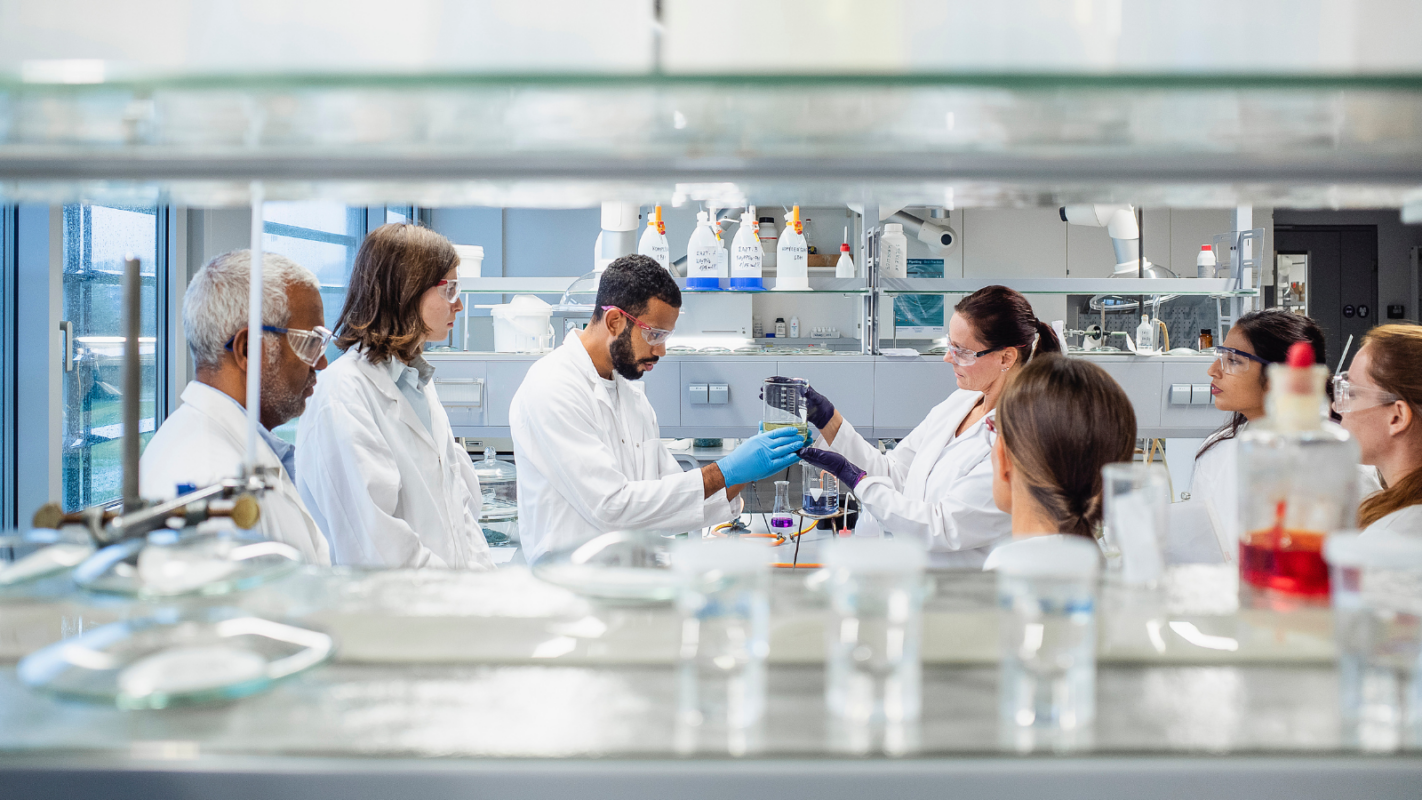

 By eLabNext
8 min read
09 Apr 2024
By eLabNext
8 min read
09 Apr 2024
Managing lab operations effectively can be a complex challenge. One that requires attention to detail, a commitment to process standardisation and a good understanding of scientific processes. Thanks to digital solutions, lab operations are becoming more streamlined, collaborative, and effective than ever.
In the intricate world of laboratory work, the ability to maintain precise control over data, samples, and workflow processes is crucial. In light of this, digital solutions like Laboratory Information Management Systems (LIMS) have become valuable tools to enhance operational efficiency, ensure compliance, and safeguard data integrity.
In this blog, we’ll explore the complex nature of lab operations and provide practical tips on how to strengthen and streamline your daily tasks through harnessing digital tools such as Electronic Lab Notebooks (ELNs) and inventory management software.
Lab operations encompass a variety of tasks, such as sample tracking, data management, inventory control, compliance monitoring, and result analysis. These tasks must be carried out with precision to ensure accurate results and maintain quality standards.
Every laboratory operation—from quality control to sample management and data analysis to reporting—relies fundamentally on precision and efficiency. Traditional manual methods of managing these processes can be time-consuming, error-prone, and challenging to scale. From manual record keeping to paper-based inventory logs to hand-written labelling, traditional lab management systems can be a barrier to streamlined lab processes and operations
In light of this, digital tools are swiftly becoming essential for efficient lab management. Let’s take a look at some of the procedures and roles that contribute to everyday lab operations.
Sample management is one of the core functions of a laboratory and involves tracking samples from receipt to final analysis. Without proper sample management, there is a risk of cross-contamination, mislabeling, or loss of samples, which can result in inaccurate results and compromise data integrity.
Data management is another pivotal operation within laboratories. It involves the systematic collection, storage, and analysis of data generated from experiments and testing. Effective data management ensures that data is accurate, retrievable, and secure. This is critical not only for the integrity of research findings and test results but also for maintaining compliance with regulatory standards.
Inventory control plays a vital role in lab operations, as it ensures that all necessary reagents and equipment are available when needed—without interruption. Proper inventory management helps to avoid unnecessary downtime that can delay experiments, as well as to prevent the wastage of resources and ensure cost efficiency.
Quality control and assurance processes are essential to ensure that lab operations meet the required standards and produce reliable, reproducible results. This includes routine calibration of equipment, validation of test methods, and regular audits of lab processes. High standards of quality control and assurance underpin the credibility and reliability of lab findings, fostering trust among stakeholders and end users.
Together, these operations form the backbone of effective and reliable lab management, ensuring that laboratories can fulfil their critical role in scientific discovery and industry quality assurance with efficiency and integrity.
Roles within a laboratory are as diverse as lab operations themselves. Technicians, scientists, data analysts, and managers work in concert to propel the lab’s mission forward. A close-knit collaboration, paired with seamless communication, formulates the essence of dynamic laboratory operations—each role proving pivotal to the collective endeavor.
Each of these diverse lab roles contribute to the effectiveness of lab operations. Their specialised skills and collaborative efforts are key to managing the complexities of laboratory work, ensuring that every aspect of the laboratory’s function is carried out with precision and care.
Achieving flawless lab operations is a multifaceted challenge, involving every aspect of daily tasks. Before we share some of our top tips and best practices for managing this, let’s consider the hurdles. Traditional lab management systems—such as paper lab records and physical folder-based inventory logs—can be a hindrance to various aspects of laboratory operations, compromising lab efficiency and efficacy.
In summary, the reliance on traditional, non-digital lab management systems significantly contributes to operational challenges, impacting efficiency, compliance, and the overall reliability of laboratory results.
We have covered some of the shortcomings of non-digital systems in managing labs. Here are our top tips to get you on the road towards more streamlined and robust operations:
1. Integrate digital lab management platforms
Integrating digital lab solutions like Laboratory Information Management Systems (LIMS), Electronic Lab Notebooks (ELN), and digital inventory management systems can transform your traditional laboratory into a technological powerhouse. Digital lab solutions are designed to address the numerous challenges associated with managing lab operations efficiently and effectively.
These systems offer a comprehensive solution to data management and integrity issues by providing centralised platforms where data can be recorded, stored, and accessed securely, ensuring traceability and reducing errors associated with manual data input and handling.
When it comes to managing lab data, LIMS and ELN platforms stand out by offering a centralised, automated hub for data recording, management and sharing. This not only facilitates the secure handling and integration of data but also promotes the seamless sharing of documents and protocols among lab personnel. The advantage of real-time updates coupled with detailed audit trails further streamlines the process of adhering to regulatory standards, taking the headache out of compliance.
ELNs, like eLabJournal, are valuable digital tools that modernise lab workflows by shifting paper documents to a centralised digital platform, enhancing efficiency from project conception to completion. They simplify data management, improve device and personnel connectivity, offer superior security, and include smart features for sample tracking and protocol management.
eLabJournal allows lab data to be directly recorded, reducing human error and enhancing reproducibility. Its accessibility eliminates time wasted searching for paper records and allows detailed planning and transcription of studies in less time.
ELNs can also promote easy sharing and collaboration, both within your lab and with external partners. eLabJournal includes features for secure data sharing and collaboration, ensuring that all stakeholders have access to the necessary information and facilitating faster decision-making and progress.
Utilising digital inventory management software such as eLabInventory can transform the way your lab manages samples, reagents and biological material. With features like barcode scanning and real-time stock-level notifications, you can maintain an accurate, instantly accessible inventory. This not only helps in avoiding the duplication of orders but also ensures you never run out of essential supplies.
eLabInventory brings flexibility to laboratory inventory management. Tailored to fit your unique inventory, sample, and specimen tracking workflows, eLabInventory provides a visual representation of your entire laboratory setup. This allows you to effectively manage your lab inventory storage and maintain a full audit trail for each sample.
The software is accessible from anywhere, ensuring secure and compliant data handling. Features such as barcode scanning, RFID scanning, and a dedicated mobile application help to keep your stock updated and reduce human errors. What’s more, notifications can be set for when specific items run low in stock so you never run out of crucial materials again.

The advantages of integrating digital solutions like eLabJournal and eLabInventory into laboratory operations are strikingly clear. With enhanced data management, sample tracking and inventory management capabilities, seamless collaboration and communication, and improved compliance with regulations, these systems offer a comprehensive solution to the major challenges faced by traditional lab operations.
By eliminating manual processes prone to human error, increasing efficiency and accuracy in workflows, and providing real-time access to data for all stakeholders, digital solutions significantly improve the overall efficiency reliability of laboratory. By digitalising your lab, you can start your journey towards operational excellence.
Encouraged by the potential of enhanced lab operations? Explore eLabNext’s suite of solutions and tailor the future of your laboratory workflows with our cutting-edge digital lab software.
and increase your efficiency with a personal demo of eLabNext’s digital solutions.


 By eLabNext
By eLabNext
Gain valuable strategies for choosing the right lab space, fostering collaboration, and achieving more with less money.
Read more
 By Zareh Zurabyan
By Zareh Zurabyan
From data quality to ethical considerations, learn how to navigate AI challenges while optimising integration for enhanced lab operations.
Read more
 By eLabNext
By eLabNext
Learn how to optimise lab procurement as part of a robust inventory management regime. Explore best practices and streamline lab ops.
Read more
Schedule a Personal Demo for friendly expert guidance and a free lab workflow assessment.